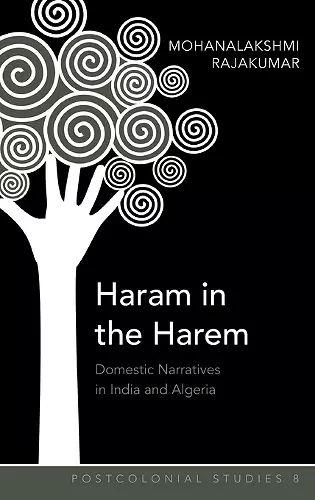Haram in the Harem
Domestic Narratives in India and Algeria
Mohanalakshmi Rajakumar author
Format:Hardback
Publisher:Peter Lang Publishing Inc
Published:15th Jul '09
Currently unavailable, and unfortunately no date known when it will be back

Haram in the Harem focuses on the differences in nationalist discourse regarding women and the way female writers conceptualized the experience of women in three contexts: the middle-class Muslim reform movement, the Algerian Revolution, and the Partition of India. During each of these periods the subject of women, their behavior, bodies, and dress were discussed by male scholars, politicians, and revolutionaries. The resonating theme amongst these disparate events is that women were believed to be best protected when they were ensconced within their homes and governed by their families, particularly male authority, whether they were fathers, brothers, or husbands. The threat to national identity was often linked to the preservation of womanly purity. Yet for the writers of this study, Ismat Chughtai (1915-1991), Assia Djebar (1936-), and Khadija Mastur (1927-1982), the danger to women was not in the public sphere but embedded within a domestic hierarchy enforced by male privilege. In their fictional texts, each writer shows how women resist, subvert, and challenge the normative behaviors prescribed in masculine discourse. In their writings they highlight the different ways women negotiated private spaces between intersecting masculine hegemonies of power including colonialism and native patriarchy. They demonstrate distinct literary viewpoints of nation, home, and women’s experiences at particular historical moments. The choice of these various texts reveals how fiction provided a safe space for female writers to contest traditional systems of power. Bringing into focus the voices and experiences of women – who existed as limited cultural icons in the nationalist discourse – is a common theme throughout the selected stories. This book showcases the fluidity of literature as a response to the intersections of gender, race, and nation.
«What makes Mohanalakshmi Rajakumar’s approach unique is her use of women authors from India and Algeria, a comparison almost nonexistent in the body of feminist literary criticism. Of particular insight is her description and analysis of violence inflicted on women’s bodies within these two cultures, a concept developed by René Girard through the expiatory victim, or her description of the home as it relates to women’s bodies. ‘Haram in the Harem’ is a must-read to all students and teachers of literature, women’s studies, and activists in general!» (Evelyne Accad, Professor Emeritus, University of Illinois; Author of ‘The Wounded Breast’ and ‘Sexuality and War: Literary Masks of the Middle East’)
«Mohanalakshmi Rajakumar examines the writings of three Muslim women, two Indian, one Algerian, who are writers crying out against the use of women’s bodies as ‘sites where opposing communities exerted their dominance or retaliated for injuries suffered’; writers resisting the ‘prevailing logic for the domestic as private, unpolluted, and different from public activity’; brave authors who show both men and women how much society is strengthened by gender equality. The book is simultaneously reasoned and passionate. Any man or woman, from any culture, who envisions a finer world will be deeply moved.» (Sidney Homan, Professor, University of Florida; Author of ‘A Fish in the Moonlight: Growing Up in the Bone Marrow Unit’, ‘Directing Shakespeare’, and ‘Beckett’s Theatres’)
ISBN: 9781433107122
Dimensions: unknown
Weight: 370g
119 pages
New edition